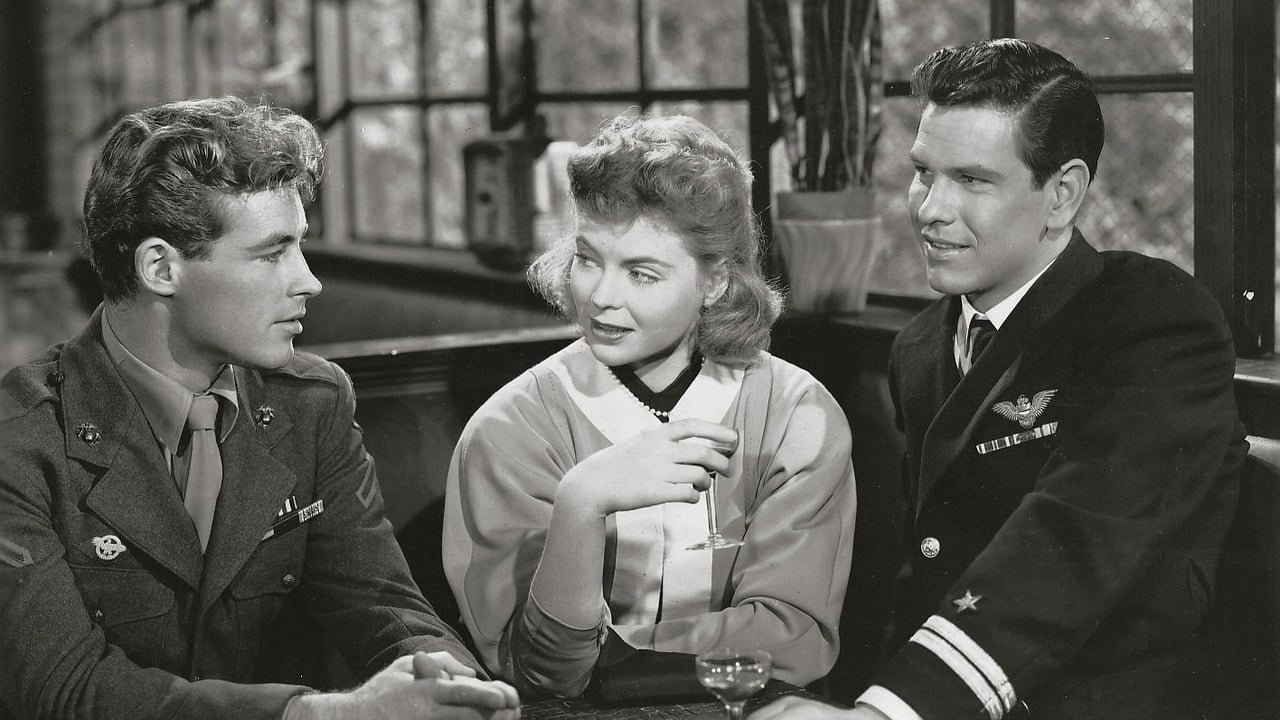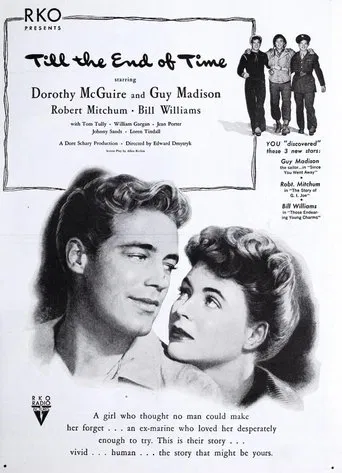

Movies such as "Till the End of Time" give an insight into what it was like at the end of WW2 when millions of servicemen returned home.I remember seeing this on Australian television around 1960. Although this film was about Americans, its themes of alienation and uncertainty were universal ones. There were only a handful of films made right after the war that actually dealt with the difficulties of returning to civilian life: "The Best Years of Our Lives", "Teresa" and "The Men" are others I can think of."Till the End of Time" starts as couple of marines, Cliff Harper (Guy Madison) and William Tabeshaw (Robert Mitchum), receive their discharge. We follow Cliff as he goes back to his middle class home, but he has a hard time fitting back in with his family. Although we never learn what he did in the war, his experiences have changed him. However his mother still sees him as a young man needing guidance - awkward moments abound. Cliff also can't relate to his pretty 18-year old neighbour, Helen Ingersoll, who has a crush on him. In a winning performance, Jean Porter plays the girl who seems so much younger than the prematurely aged veteran. Cliff eventually begins a relationship with the older Pat Ruscombe (Dorothy McGuire), a war widow who is as much a victim of the war as the men who have been wounded. Despite Guy Madison's slightly hesitant performance he is disarmingly natural. Cliff's buddies in the film are both men who have been physically injured: Tabeshaw has a steel plate in his head and also can't settle down, and ex-boxer Perry Kincheloe (Bill Williams) can't adjust to the loss of both legs.Although actually released first, this film has similarities to "The Best Years of Our Lives" especially the double amputee veteran and the brawl with men who question the values the servicemen fought for. In the case of "Till the End of Time" the fight starts when a group of men cast aspersions on 'Catholics, Jews and Negroes'. An interesting segment in a Hollywood movie at a time when US armed forces were still segregated, and before films such as "Crossfire", "Gentlemen's Agreement" and "Home of the Brave" highlighted discrimination.Documentaries show us what it looked like, but movies show us how it felt. This little known film is a window on a unique period in history. Like "The Best Years of Our Lives", it's a film that should be preserved and appreciated till the end of time.
... View MoreReleased in 1946, the same year as "The Best Years Of Our Lives" this film tackles the issues that veterans and their families face. Robert Mitchum fans will melt. Guy Madison and Dorothy McQuire give deep performances. This film takes a long cold stare at the sense of loss on the Home Front and in the souls of men and women of the time. The theme is of an overwhelming feeling that is Shock; of lost love, lost lives and lost opportunities. This is a film about Recovery and merely coping with what War does to us all. We see civilians trying to help these veterans re-orient to normal, dull, daily life, which the despise. A real character study of Americans as they rebuild their damaged lives.Ron
... View MoreNo need to repeat the plot. That scene where Pat (McGuire) and Cliff (Madison) encounter the shell-shocked outpatient is genuinely disturbing. For a screenplay, that's a tough problem to treat in a single set-up. Pat's little anecdotal lesson works pretty well-- the soldier is relieved of his demons for the moment. But for how long, I wonder. And what will become of him, sitting alone, quaking, and afraid to go home. And how many others will come home like him. The script says the inner wounds will wear off eventually, but then it had to say something like that, otherwise the movie's hopeful tone would be compromised. And that would be counter to what the country needs following four years of horror. It' a decent, earnest movie, produced by the studio's (RKO) head honcho Dore Schary, so it's a prestige production. Looks like they took a gamble on an unknown Guy Madison in the lead role. He certainly looks the part—I can just about hear the echoing squeals of bobby- soxers even 60 years later. He does bring an earnestness that's refreshing, even if his range is pretty limited as the heavier scenes show. Newcomers Mitchum and the underrated Bill Williams also register, along with the dewy-eyed Dorothy McGuire before she became a favorite movie mom. But I especially like Jean Porter's vivacious teenager. It's really her Helen who projects the buoyant spirit of the coming consumer age.There were, of course, a number of these "adjustment" films as the country struggled with a return to normalcy. Where this movie excels is with the uncertainty of a recovering civilian world. Each main character is drifting as a result of the war. Each has been changed and must now work out how to fit back in. Then too, I like the rather ambivalent way the movie ends, avoiding easy solutions. There's one other sequence worth noting. The barroom brawl is both over-done and clumsily staged. Nonetheless, it makes an important point. Namely, that the war has changed society as well as individuals. A post-war America will be more inclusive than the traditional America. The logic appears to be that since it took everyone to win the war, no one should be excluded from the fruits. Given the civil rights movement soon to emerge, the movie thus proves prophetic. Too bad this worthy movie effort now seems so obscure. Despite the years, it remains an affecting look at a key period in American life and merits catching up with.(In passing—that's filmmaker Blake Edwards of Pink Panther fame as the shop foreman that Cliff tangles with, soon to become a screenwriter, and then an A-picture producer-director.)
... View MoreSome jerk movie reviewer says it was to much of a tear jerker. What does he or she know. I , being a Vietnam combat vet, remember seeing the movie some years ago on TV and thinking how much I related to the story line. I can't remember much about the movie except for the fact that the filmmaker was right on when it came to trying to readjust. It ain't easy. Lots of resentment and hostility. The story may have tugged at the heart but film making has got to deal with the emotional side of ones story as well as the artful aspects of making a film. The reviewer obviously has spent no time in combat so as a result the main theme of the story escapes him or her. FIGURES
... View More